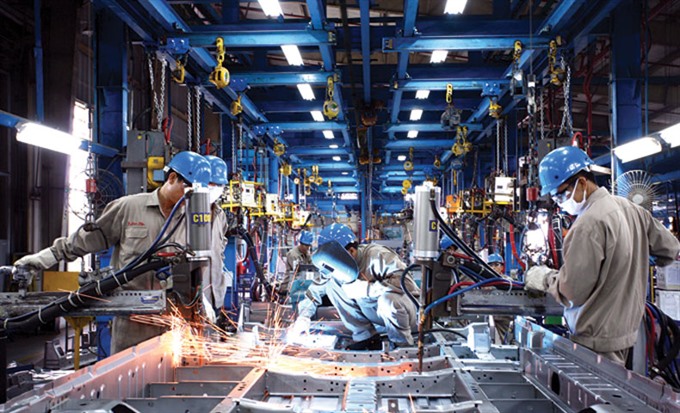Vietnam: Industrial growth slow, labour productivity low: Party official
Hanoi — Vietnam’s industry is developing too slowly and is still reliant on many foreign-invested enterprises, says Nguyen Van Binh, head of the Party Central Committee’s Commission of Economic Affairs.
He was speaking at a conference held in Hanoi late last week on national industrial development policies until 2025 with a vision to 2035.
Between 2006 and 2015, the country’s total industrial production value rose 3.42 times, while the industrial portion of the GDP remained stable at 31-32 per cent.
While this has created jobs and contributed to socio-economic development, “industrial production growth has been weak and unsustainable; and industrial labour productivity, especially in the processing and manufacturing industries, has been low,” Bình said.
But the growth of average labour productivity in the industrial sector, especially in manufacturing, has been at a low level of 2.4 per cent a year, lower than that of the economic growth rate of 3.9 per cent in the 2006-15 period, he noted.
In comparison with other countries in the region, Vietnam’s industrial productivity lags behind, Malaysia’s and Thailand’s is 6.4 times greater, and that of the Philippines is 3.4 times higher.
Bình stressed the need to develop a comprehensive industrial policy framework to promote and improve the quality of national industrialisation and modernisation during the 2016-25 period.
Nguyen Duc Kien, vice chairman of the National Assembly’s Economic Committee, agreed. “It time to change the thinking and create a favourable investment environment for all economic sectors to develop industries,” Kien said.
Deputy Minister of Industry and Trade Đo Thang Hai said Vietnam should continue to update its mechanisms and policies to create a favourable environment for attracting investment.
“Furthermore, the country must clearly define the role of economic components in industrial development to appropriately orient development policies, promote the application of new technologies, facilitate labour restructuring, improve the quality of industrial human resources and diversify financial resources for industrial development,” Hai added.
Experts also discussed experiences in developing industrial policies in countries such as Japan, South Korea and Thailand, as well as identifying opportunities and challenges for industrial development.
Participants proposed several orientations for industrial development policy, including adjusting the investment structure, selecting key sectors to set investment priorities, facilitating supporting industry development and protecting domestic production with technical barriers. — VNS
Source: http://vietnamnews.vn/economy/372699/industrial-growth-slow-labour-productivity-low-party-official.html#PRd6xyc28IqSJBe8.99


 English
English




